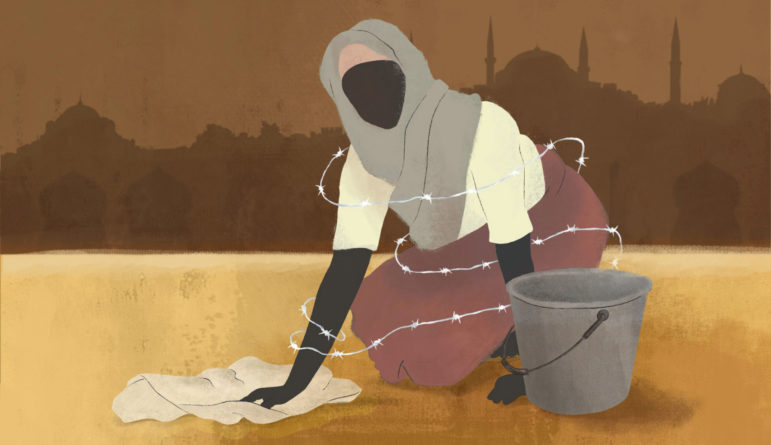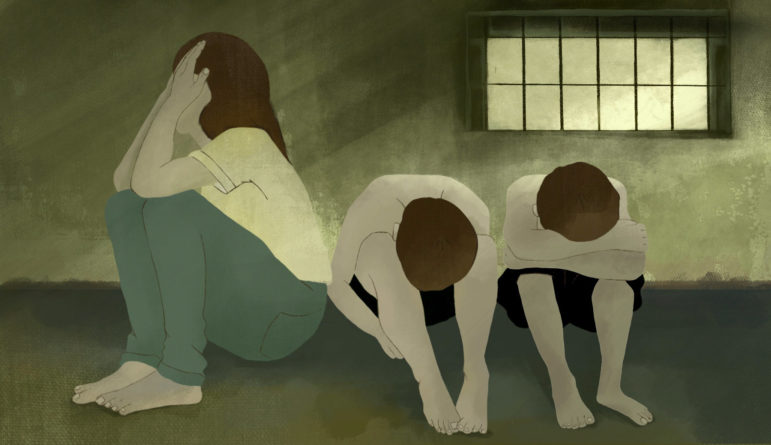

Illustration: Marcelle Louw for GIJN
Chapter 15 – Reporting Guide for United Arab Emirates
Read this article in
Chapter Guide Resource
Introduction: GIJN Guide to Reporting on Migration in the Gulf Arab Countries
Chapter Guide Resource
Chapter 1 – Best Practices and Suggested Topics in the COVID Era
Chapter Guide Resource
Chapter 2 – COVID-19 and Migrant Workers in the Gulf
Chapter Guide Resource
Chapter 3 – Statistics and Studies
Chapter Guide Resource
Chapter 4 – Essential Reading
Chapter Guide Resource
Chapter 5 – Experts Guide
Chapter Guide Resource
Chapter 6 – Trafficking Case Studies
Chapter Guide Resource
Chapter 7 – First-Hand Reporting Accounts
Chapter Guide Resource
Chapter 8 – Key Terms
Chapter Guide Resource
Chapter 9 – Trafficking and Forced Labor Glossary
Chapter Guide Resource
Chapter 10 – Reporting Guide for Bahrain
Chapter Guide Resource
Chapter 11 – Reporting Guide for Kuwait
Chapter Guide Resource
Chapter 12 – Reporting Guide for Oman
Chapter Guide Resource
Chapter 13 – Reporting Guide for Qatar
Chapter Guide Resource
Chapter 14 – Reporting Guide for Saudi Arabia
Chapter Guide Resource
Chapter 15 – Reporting Guide for United Arab Emirates
These tips were provided by Yasin Kakande, Ugandan journalist deported for covering migrant worker issues in the United Arab Emirates.
Media Environment
A journalist seeking to write about human trafficking in the UAE has to understand that any writing seen as contrary to the government narrative is a punishable offense. The local press law prohibits criticism of the government and ruling family, and reserves the right to censor any publication. The 2012 cybercrime law further penalizes online activities which includes information sharing, digital journalism, and social media. Punishments can range from fines to imprisonment without trial and outright deportation.

The United Arab Emirates was ranked 131st in Reporters Sans Frontières’ 2021 World Press Freedom Index. Image: Screenshot
Be extremely cautious with your digital security: locally-based and visiting foreign journalists have been detained and deported for attempting to cover migrant worker issues. Also keep in mind that, even if a piece’s tone and substance are not very strong, punishment is still possible. Even simple observations of the way workers are recruited to work in the UAE or referencing their working conditions can earn deportation or a prison term.
Finding and Pursuing Stories
Government Sources
While there is no law guaranteeing freedom of information, there are recognized avenues to attempt to access data and other information from government sources.
Government departments have public relations offices that can help give some information on cases related to human trafficking. All police departments in the Emirates have a media office, and police in Dubai and Sharjah also have a human trafficking department. The courts and public prosecutions in all Emirates also have labor offices that handle labor-related cases, and you can apply to review court documents.
Another main government source of information on human trafficking is the National Committee to Combat Human Trafficking, which is based in Abu Dhabi. While this committee will give only positive information on their efforts to combat trafficking, it is worth checking out.
The Ministry of Human Resources & Emiratisation offices in Dubai and Sharjah occasionally publish reports of trafficking cases. While it might be easier to follow up on some of the cases it publishes in local dailies, their offices are also a good place to connect with workers who have trafficking-related problems and are seeking to terminate their contracts to return home. These workers could speak to you once you win their confidence, using interpreters from the community. When speaking to trafficking victims it is better to speak their language.
Keep in mind that some officials in these offices are friendly and could provide information on specific cases they are handling. While English is widely spoken, many government officials speak very little English and are more comfortable sharing information related to sensitive topics like human trafficking in Arabic. Government sources will want to be reassured that the piece you are writing will not cause them any problems.
Remember, some officials will ask that you let them preview any story that includes their comments. While you can share their quotes and check facts, avoid sharing portions of your article before publication.
Interviews and Meetings
Labor camps and construction worksites, while they can be great sources of information, also present great risks for journalists. In order to visit workers’ accommodation, you need to know a worker staying there. Note: If your entry to the camp will put your interlocutors (worker residents) at risk, meet them outside the camp, on private property. Equipping workers with a disposable camera would allow them to record their experiences. However, caution must be exercised, and it is best to avoid revealing the faces of workers in the camp. Also, always be cautious when visiting a worker camp. You could be considered to be trespassing and prosecuted accordingly.
To approach workers outside of labor camps, consider the areas where they spend their day off: Baniyas Square in Deira, the Gold Souq, bus stations like Al Sabkha, and the Dubai Creek on the weekends.
Brothels are common in all of the Emirates and can be a good source of information on trafficked victims. Almost every big community of Indians, Filipinos, Bangladeshis, Iranians, and Ethiopians will have a brothel with women mostly trafficked from those countries. You will need extraordinary creativity to be able to talk to the women in the brothels without alarming them or their pimps. (Also keep in mind the distinction between those trafficked into sex work, and sex workers generally.)
Closely related to brothels are nightclubs. In Dubai, Baniyas Square and Khaled bin Al Waleed Street in Bur Dubai have the most nightclubs with women trafficked into sex work. While the Ewa’a shelters for trafficked women do not release personal information, they can be a useful resource for general insights and leads.
























